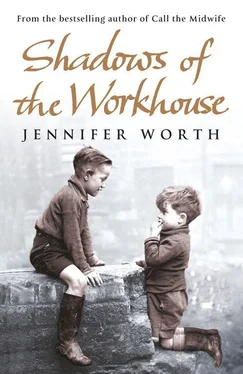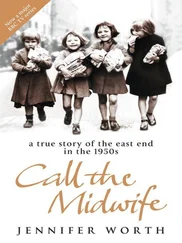Jennifer Worth - Shadows Of The Workhouse - The Drama Of Life In Postwar London
Здесь есть возможность читать онлайн «Jennifer Worth - Shadows Of The Workhouse - The Drama Of Life In Postwar London» весь текст электронной книги совершенно бесплатно (целиком полную версию без сокращений). В некоторых случаях можно слушать аудио, скачать через торрент в формате fb2 и присутствует краткое содержание. Жанр: Биографии и Мемуары, на английском языке. Описание произведения, (предисловие) а так же отзывы посетителей доступны на портале библиотеки ЛибКат.
- Название:Shadows Of The Workhouse: The Drama Of Life In Postwar London
- Автор:
- Жанр:
- Год:неизвестен
- ISBN:нет данных
- Рейтинг книги:5 / 5. Голосов: 1
-
Избранное:Добавить в избранное
- Отзывы:
-
Ваша оценка:
- 100
- 1
- 2
- 3
- 4
- 5
Shadows Of The Workhouse: The Drama Of Life In Postwar London: краткое содержание, описание и аннотация
Предлагаем к чтению аннотацию, описание, краткое содержание или предисловие (зависит от того, что написал сам автор книги «Shadows Of The Workhouse: The Drama Of Life In Postwar London»). Если вы не нашли необходимую информацию о книге — напишите в комментариях, мы постараемся отыскать её.
Shadows Of The Workhouse: The Drama Of Life In Postwar London — читать онлайн бесплатно полную книгу (весь текст) целиком
Ниже представлен текст книги, разбитый по страницам. Система сохранения места последней прочитанной страницы, позволяет с удобством читать онлайн бесплатно книгу «Shadows Of The Workhouse: The Drama Of Life In Postwar London», без необходимости каждый раз заново искать на чём Вы остановились. Поставьте закладку, и сможете в любой момент перейти на страницу, на которой закончили чтение.
Интервал:
Закладка:
It was about 7.30 p.m. when I approached the ward, and the screams assailed me long before I pushed open the door. A harassed-looking staff nurse was on duty, and as I ran towards the side ward a frightened nurse whispered: “I think he’s gone mad.”
Mr Collett was sitting bolt upright in bed, his blind eyes staring, wide with terror. He was waving his arms and screaming: “Watch out, to your left, a grenade exploding.” He screamed and ducked to escape an invisible missile flying over his head.
I ran to him, and took him in my arms. “It’s me, Jenny. Me, I’m here.”
He grabbed me with superhuman strength and pushed me down to the floor. “Get down, keep your head down. They’ll blow you to bits. A bloke over there had his head blown off a minute ago. That one over there has lost both his legs. It’s a terrible place to be. Gunfire all around. Down. GET DOWN!” He screamed with all his strength and hurled himself forward. The stumps of his legs twitched violently and he fell out of bed. He seemed impervious to the fall, and grabbed me, pulling me under the bed with him.
“Stay here. You’ll be safe here, in the shelter. I’ll keep a lookout for any other poor soul. Look out!” He screamed and looked up. “That plane, see, it’s just dropped its load of bombs, they’re coming for us. It’ll be a direct hit.” He screamed louder than ever, “KEEP DOWN!”
A doctor and two male orderlies rushed into the ward. The staff nurse had a syringe filled and ready. The orderlies crawled under the bed and held Mr Collett, who was fighting and screaming. The doctor injected a powerful anaesthetic and a few minutes later, Mr Collett rolled over onto his side, asleep, but the stumps of his legs twitched violently with involuntary nervous spasms.
We were all shaken and trembling. The two orderlies picked the old man up and put him back into bed. He looked peaceful again. The hospital staff left, but I sat by his bedside for a long time, crying quietly.
At nine thirty the night sister asked me to leave, saying he would be kept sedated all night, and telling me to ring in the morning.
Before breakfast, I rang the hospital, and was told that Mr Collett had died peacefully at 3.30 a.m.
There was no last post for the old soldier; no solemn drum roll; no final salute; no lowering of the colours. There was just a contract funeral, arranged by the hospital, leaving from a hidden area next to the morgue. A priest and one mourner followed the coffin, and we travelled in the hearse, next to the driver. I had not thought of flowers until nearly at the hospital gate, so I had bought a bunch of Michaelmas daisies from a street flower-seller. We were driven to a cemetery somewhere in North London. I don’t remember where it was. I only remember a cold, bleak November day, as we stood on either side of the open grave, the priest and I, reciting the office for the burial of the dead: “Dust to dust, ashes to ashes.” The men shovelled the soil over the coffin, and I laid the purple daisies on the rich brown earth.
CODA
It was many years later – perhaps fifteen or twenty years – when Mr Collett visited me. I was happily married, my daughters growing up, my life in full flow. I had not thought of Mr Collett for years.
I woke in the middle of the night, and he was standing at the side of my bed. He was as real as my husband sleeping beside me. He was tall, and upright, but looked younger than when I had known him, like a handsome man of about sixty or sixty-five. He was smiling, and then he said, “You know the secret of life, my dear, because you know how to love.”
And then he disappeared.
THE END
Epilogue
In 1930 the workhouses were closed by Act of Parliament – officially, that is. But in practice it was impossible to close them. They housed thousands of people who had nowhere else to live. Such people could not be turned out into the streets. Apart from that, many of them had been in the workhouses for so long, subject to the discipline and routine, that they were completely institutionalised, and could not have adjusted to the outside world. Also, the 1930s were the decade of economic depression, with massive unemployment nationwide. Thousands of workhouse inmates suddenly thrown onto the labour market would only have made matters worse.
So the workhouses were officially designated “Public Assistance Institutions” and, in order to make them more acceptable, would be locally referred to by such names as “Glebe House”, “Rose House”, and so on. But in practice they carried on much the same as before. The label “pauper” was replaced by “inmate”, and the uniform was scrapped. Comforts, such as heating, a sitting room, easy chairs and better food were introduced. Inmates were allowed out. The inhumane practice of splitting families was stopped. But still it was institutional life. The staff were the same, and the attitudes and mindset of the master and officers were stuck firmly in the nineteenth century. Discipline remained strict, sometimes inflexible, depending on the character of the master, but punishments for transgression of the rules were relaxed, and life was certainly easier for the inmates of the Institution than it had been for the paupers of the workhouse.
The buildings continued in use for many decades for a variety of purposes. Some were used as mental hospitals right up until the 1980s, when they were finally closed by the Prime Minister, Margaret Thatcher. Many were used as old people’s homes, and my description of Mr Collett’s last weeks in such a place in the late 1950s is by no means unique. I was giving a talk to the East London History Society about this book when it was first published, and a lady in the audience stood up and said, “Your description is not exaggerated. In the 1980s I was with a group of people taken round an old people’s home which had formerly been a workhouse and the conditions you describe were exactly the same. This was, as far as I remember, in 1985 or 1986.”
The infirmaries continued as general hospitals for many decades. But the stigma of the old association with the workhouses was never eradicated. During my nursing career I saw many times the fear in a patient’s eyes who thought they’d been put in a workhouse, even though they were in a modern hospital. In 2005 I was giving a radio talk and I mentioned this. The interviewer said, “I know exactly what you mean. Only a few years ago, in 1998, my granny was taken to the infirmary. She begged and pleaded not to go because she thought she was being put in the workhouse. She was terrified, and I swear it was that which killed her.” The stigma lingered and most of the old infirmaries in the country have now been demolished, or converted into commercial or residential buildings
We who live comfortable, affluent lives in the twenty-first century cannot begin to imagine what it must have been like to be a pauper in a workhouse. We cannot picture relentless cold with little heating, no adequate clothing or warm bedding, and insufficient food. We cannot imagine our children being taken away from us because we are too poor to feed them, nor our liberty being curtailed for the simple crime of being poor. There are very few records left to tell us what the lives of workhouse paupers were like. Every workhouse kept meticulous records – but these were official records written by administrators; the paupers themselves kept no records. Similarly there are very few photographs of the paupers. Thousands of archive photographs of the buildings, the guardians, the masters, their wives and officers can be found in council records; but there are virtually none of the paupers themselves. The few that we do have are tragic to behold. There is a blank, hopeless look on all the faces, the same dull eyes, the same death-like despair.
Читать дальшеИнтервал:
Закладка:
Похожие книги на «Shadows Of The Workhouse: The Drama Of Life In Postwar London»
Представляем Вашему вниманию похожие книги на «Shadows Of The Workhouse: The Drama Of Life In Postwar London» списком для выбора. Мы отобрали схожую по названию и смыслу литературу в надежде предоставить читателям больше вариантов отыскать новые, интересные, ещё непрочитанные произведения.
Обсуждение, отзывы о книге «Shadows Of The Workhouse: The Drama Of Life In Postwar London» и просто собственные мнения читателей. Оставьте ваши комментарии, напишите, что Вы думаете о произведении, его смысле или главных героях. Укажите что конкретно понравилось, а что нет, и почему Вы так считаете.






![Theresa Cheung - The Dream Dictionary from A to Z [Revised edition] - The Ultimate A–Z to Interpret the Secrets of Your Dreams](/books/692092/theresa-cheung-the-dream-dictionary-from-a-to-z-r-thumb.webp)





